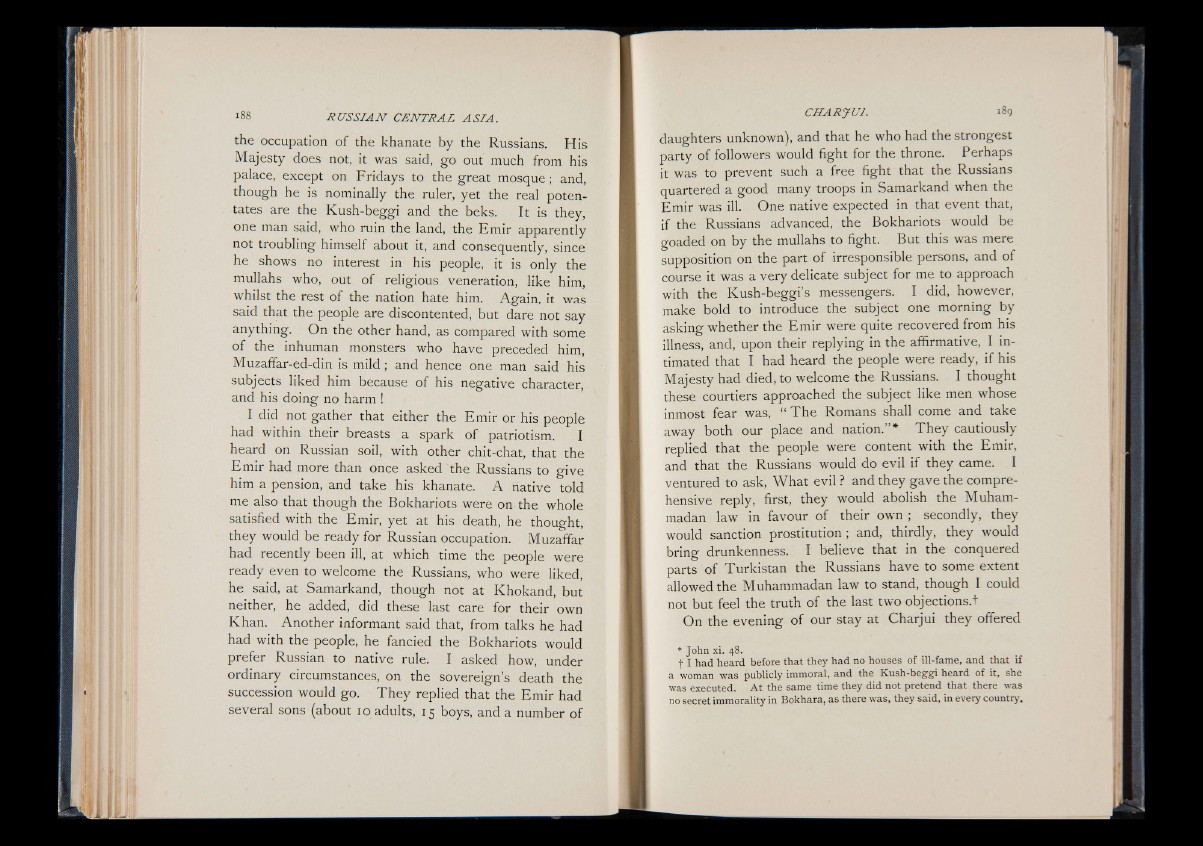
the occupation of the khanate by the Russians. His
Majesty does not, it was said, go out much from his
palace, except on Fridays to the great mosque; and,
though he is nominally the ruler, yet the real potentates
are the Kush-beggi and the beks. It is they,
one man said, who ruin the land, the Emir apparently
not troubling himself about it, and consequently, since
he shows no interest in his people, it is only the
mullahs who, out of religious veneration, like him,
whilst the rest of the nation hate him. Again, it was
said that the people are discontented, but dare not say
anything. On the other hand, as compared with some
o f the inhuman monsters who have preceded him,
Muzaffar-ed-din is mild; and hence one man said his
subjects liked him because of his negative character,
and his doing no harm !
I did not gather that either the Emir or his people
had within their breasts a spark o f patriotism. I
heard on Russian soil, with other chit-chat, that the
Emir had more than once asked the Russians to give
him a pension, and take his khanate. A native told
me also that though the Bokhariots were on the whole
satisfied with the Emir, yet at his death, he thought,
they would be ready for Russian occupation. Muzaffar
had recently been ill, at which time the people were
ready even to welcome the Russians, who were liked,
he said, at Samarkand, though not at Khokand, but
neither, he added, did these last care for their own
Khan. Another informant said that, from talks he had
had with the people, he fancied the Bokhariots would
prefer Russian to native rule. I asked how, under
ordinary circumstances, on the sovereign’s death the
succession would go. T hey replied that the Emir had
several sons (about 10 adults, 15 boys, and a number of
daughters unknown), and that he who had the strongest
party of followers would fight for the throne. Perhaps
it was to prevent such a free fight that the Russians
quartered a good many troops in Samarkand when the
Emir was ill. One native expected in that event that,
if the Russians advanced, the Bokhariots would be
goaded on by the mullahs to fight. But this was mere
supposition on the part of irresponsible persons, and of
course it was a very delicate subject for me to approach
with the Kush-beggi’s messengers. I did, however,
make bold to introduce the subject one morning by
asking whether the Emir were quite recovered from his
illness, and, upon their replying in the affirmative, I intimated
that I had heard the people were ready, if his
Majesty had died, to welcome the Russians. I thought
these courtiers approached the subject like men whose
inmost fear was, “ T h e Romans shall come and take
away both our place and nation.” * They cautiously
replied that the people were content with the Emir,
and that the Russians would do evil if they came. I
ventured to ask, What evil ? and they gave the comprehensive
reply, first, they would abolish the Muhammadan
law in favour of their own ; secondly, they
would sanction prostitution; and, thirdly, they would
bring drunkenness. I believe that in the conquered
parts of Turkistan the Russians have to some extent
allowed the Muhammadan law to stand, though I could
not but feel the truth of the last two objections.t
On the evening of our stay at Charjui they offered
* John xi. 48.
f I had heard before that they had no houses of ill-fame, and that if
a woman was publicly immoral, and the Kush-beggi heard of it, she
was executed. At the same time they did not pretend that there was
no secret immorality in Bokhara, as there was, they said, in every country.